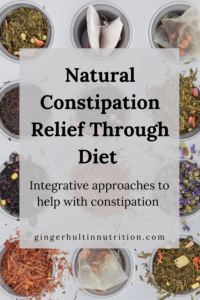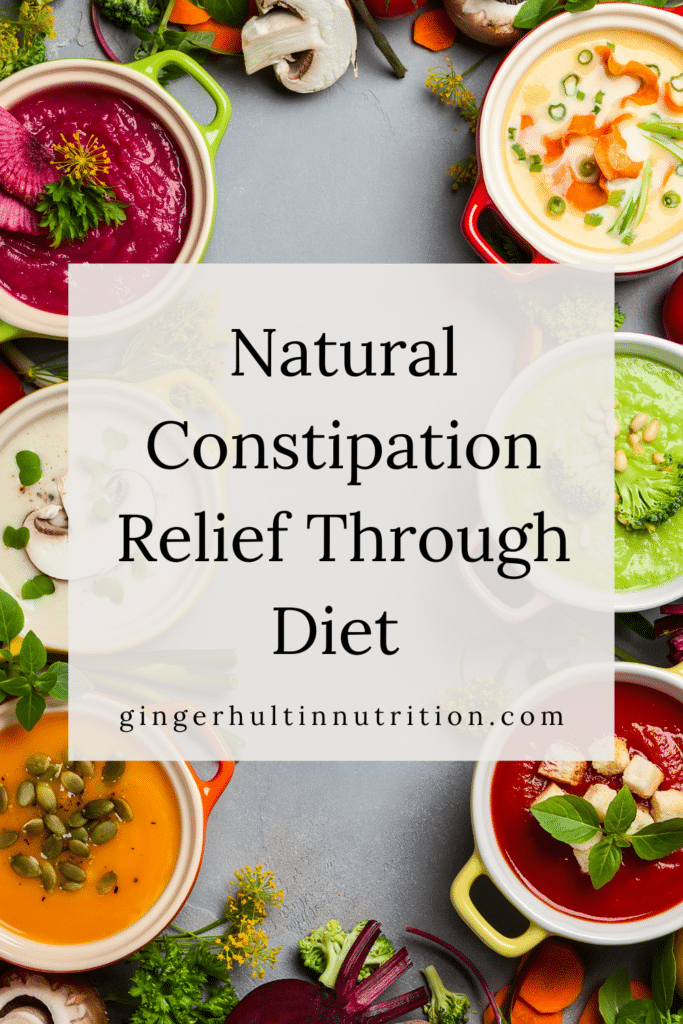Table of Contents
While it may not always be a main area of focus during treatment of a chronic disease, constipation can be a very unpleasant side effect that impacts your health in a major way. I’ve seen my clients lose weight, struggle to eat, and live in a lot of pain and stress due to uncontrolled constipation. Opiate pain relievers, reduced activity, changing eating patterns, reduced fluid intake, and treatments like chemotherapy or other medications can all lead to and exacerbate constipation. Diet and lifestyle can play a role in relieving this discomfort and staying ahead of it so it’s not impacting your health. My team and I discuss natural constipation relief and how to mediate other possible side effects with our clients in order to be proactive and come up with a personalized plan to help them feel better.
Constipation can be uncomfortable and oftentimes painful, causing people to lose their appetite and avoid eating. This is why when working with someone struggling with constipation, I find that it can be a struggle for them to meet their nutritional needs, which can become a barrier to healing. This is why having a great dietitian to work with is key throughout your journey. It’s important to be proactive here and not let constipation get in your way. Including certain foods can help relieve symptoms of constipation and help you feel more comfortable as you work to heal your constipation.

Fiber-Rich Foods
One way to help alleviate constipation is to focus on high fiber foods. There are two different types of fiber – soluble and insoluble. Both of which are important for gut health.
Soluble fiber dissolves in water and makes a gel-like substance that adds bulk to stool and helps keep things ‘moving’. Good sources of soluble fiber can be found in:
- Fruits
- Nuts + seeds
- Beans + lentils
My top favorite anti-inflammatory and high fiber soluble fiber foods include:
Citrus fruits (oranges, lemons, etc) contain abundant fiber, including a type of soluble fiber called pectin. You’ll find the most fiber in the pith, the white part of the peel, which is also helpful in relieving constipation. Research is being conducted on a specific flavonoid called naringenin, a compound found in oranges, for its potential to act as a laxative and relieve constipation
Pears are a great example of a fruit where most of the fiber is found in the skin. Pears also contain a sugar called sorbitol, a sugar alcohol which in combination with fiber tends to ease constipation, making them a great fruit to enjoy if you’re feeling constipated.
Beans are incredibly versatile, I put them in tacos, enchiladas, or burritos, on salads, or even serve them in a dip like hummus which I find is often even more digestible. They are full of fiber and have many other helpful nutrients like protein, iron and magnesium.
Fruits can be eaten raw as a snack, added to oatmeal or smoothies, made into a healthy cobbler, or chopped up in salads to add a sweet element. Many fruits have a high water content, so this can be a tasty way to get more fluids in your diet without having to drink a bunch of liquids. There is some chatter about limiting fruit due to “sugar content” but please keep in mind that fruit isn’t innately ‘sugary’ and has no added sugars. In fact, fruit is actually relatively low glycemic- high in fiber, water, and nutrients your body needs when struggling with constipation.
Now, let’s talk about insoluble fiber.
Insoluble fiber does not absorb water, but does feed healthy gut bacteria (you may have heard about your microbiome – this is it). Insoluble fiber also helps move waste through and out of your digestive system, improving constipation. You’ll probably notice that some foods are on both lists and that’s important to know. Many foods are actually a combination of both fibers! Double bonus. Good sources of insoluble fiber are found in:
- Whole grains
- Nuts + seeds
- Beans
- Vegetables
Prunes are a rich source of both soluble and insoluble fiber that aids in bulking up stool and helping it pass more easily. Prunes and prune juice are also a rich source of sorbitol, a sugar alcohol that acts as a natural laxative. Prunes can be eaten as they are, or you can mix them in your breakfast cereal or with nuts and other dried fruits for a healthy trail mix.
Spinach and other dark leafy greens are another rich source of fiber to add to your diet. Just one cup of cooked spinach contains 4 grams of fiber, about 17% of the recommended daily value for fiber. It’s also high in magnesium, which draws water into the colon and acts as a laxative. One cup of cooked spinach contains 50% of the daily recommended magnesium.
Fluids
Adequate fluid intake is very important if you are struggling with constipation. Besides the usual advice to “just drink more water” you can try to find things that help you get more fluids. I have a whole blog post on how to make water more palatable but some other ideas include:
- Find some fancy non-alcoholic drinks to make including infused sparkling or flat water. You can try adding fruits, herbs, or a splash of juice to add some flavor to your water.
- Make my melon-infused water – it’s so good!
- Find some teas that you enjoy. There are lots of options when it comes to tea such as mint, cinnamon, chamomile, green, black, and white tea. Additionally, there are teas to help with relaxation, stomachache, constipation, and sleep. Try some out and see what works for you.
- Eat more plants. Remember, fruits and vegetables have a high water content, which count towards your daily intake.
Lifestyle Habits to Ease Constipation
Your lifestyle can have a dramatic effect on how your whole body functions. Movement, stress, and sleep have impacts on all facets of your health including your bathroom habits.
Exercise: Getting movement whether it’s a 45-minute walk outside, a quick 20 minutes in the gym, or gentle stretching is helpful. Regular movement and exercise helps reduce the amount of time it takes food to move through the large intestine, limiting the amount of water that’s reabsorbed from your stool. The less water that’s reabsorbed from your stool the easier it is for you to go to the bathroom.
I understand that finding the time to exercise in our busy world can be tough. Focusing on movements that feel good and talking it slow when needed is important for all aspects of health. Try to find activities that you enjoy and make you feel rejuvenated, and practice them on days when your energy is low.
Stress: You may notice that stress can make your muscles tight and contribute to pain. Stress can trigger the “fight or flight” reflex that works in opposition to your body’s “rest and digest” system, which aids in digestion and helps your body recover and heal itself. Finding ways to reduce stress not only helps with constipation, but supports general health during treatment.
Be sure to find something you enjoy, that can take your mind off of things and promote self-healing. For some it may be meditation or yoga, others may enjoy a hot bath, spending time with family, or reading a good book. Anything that you find relaxing and enjoyable counts.
I have a really nice post about mindfulness and stress on the Greater Seattle Dietetic Association blog from a few years ago. Be sure to check it out if you’re working on these skills with eating or any other aspect in your life.
Sleep: As with stress, poor sleep can rob your body of time to reset, repair, and rejuvenate. Practicing healthy sleep hygiene, avoiding caffeine at least 8 hours before bedtime, and taking time to unwind by avoiding screen time 1 to 2 hours before bed are just a few strategies that I often recommend to my clients. If getting quality sleep is an ongoing issue be sure to work with your doctor on a plan to improve your sleep.
If you’re interested in learning about supplements for sleep – I have an interesting piece on melatonin in Today’s Dietitian right here.
Pain Management
My clients struggling with constipation are oftentimes also dealing with another type of condition such as cancer, autoimmune issues, heart disease, and diabetes all of which cause inflammation. They can find themselves struggling with pain and discomfort, and constipation can really add onto their discomfort levels. Some of my clients are on opioid pain relievers which can further increase issues with constipation.
I like to take a food first approach when working with clients struggling with inflammatory conditions. Plant-based foods have many health benefits including being anti-inflammatory in nature.
There are proven pain relief benefits to alternative treatments such as massage, acupuncture, and other healing modalities. Cannabinoid products have also been proven to help manage pain. A discussion with your care team could be helpful to see if any of these integrative options are right for you. You may also find it beneficial to work with a pain expert who can help you find alternative ways of dealing with pain to reduce your need for opiate pain relievers, especially when constipation is the issue.
Constipation can be a direct side effect of some treatments or medications, it can also be a sign that your body isn’t functioning optimally. I hope these tips for relieving constipation and supporting your health with an integrative approach are helpful to you. It can be very beneficial to have a dietitian as part of your care team to help support your individual needs during this difficult time. I love hearing from my readers and I am here to help, try some of these strategies out and let me know if any worked for you in the comments section below!










More Stories
The One Thing You Should Never, Ever Do if You Have Insulin Resistance and Want to Lose Weight
Tuna Salad Lunch Box – JSHealth
Advanced Wellness Course – Heart Health